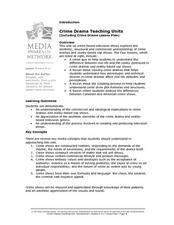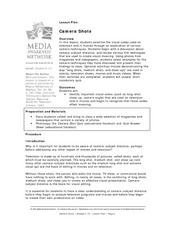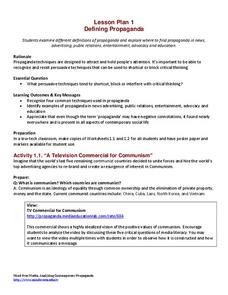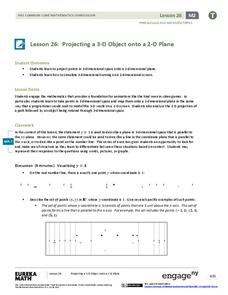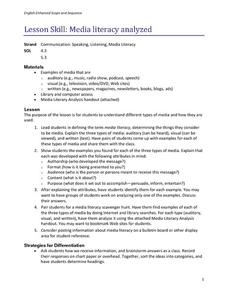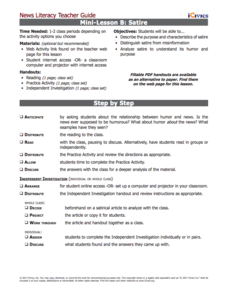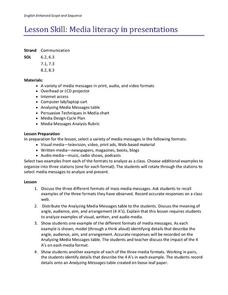Missouri Department of Elementary
The Clique
Mean girls and bully packs are favorite topic for films and TV shows that focus on the destructive power of cliques. High school freshmen are asked to reflect on both the positive and negative aspects of cliques by reading a short...
Curated OER
Is the Brady Bunch Biased
Students examine gender bias on television and in the movies. In this social science lesson, students watch various shows and when an instance of stereotypical behavior, or gender bias situation occurs, students think about the problem....
Curated OER
Television: Comedy Vs. Drama
Students investigate the world of Television by contrasting specific programs. In this visual storytelling lesson, students compare and contrast the differences between comedy and drama by making a Venn Diagram. Students...
Curated OER
Crime Drama Teaching Units
Investigate the nature of crime dramas on television. What exactly are they trying to portray? Questions and a comparison chart support learners as they watch shows from Canada, Great Britain, and the United States. An oral presentation...
Curated OER
Plot of a Short Story (SMART Board)
Help your pupils track the plot of a short story with this SMART Board activity. Using the short story "The Dinner Party" by Mona Gardner (though the instructional activity would work with any other short story), they define the...
Museum of the Moving Image
Developing Critical Analysis
To gain an understanding of how images and sounds are used to influence viewers, class members analyze these features in Presidential campaign commercials from 1952-2012.
Curated OER
Camera Shots
Understanding how visual codes such as long-shots, close-ups, and camera angles affect meaning helps prepare young filmmakers to plan their own productions. The concepts embedded could also be used to analyze photographs and paintings.
Curated OER
TV Talks, We Listen?
Students recognize and analyze the link between advertisements and commercial programs as well as their influence on the audience. In this television and advertisement analysis lesson, students watch television to research the audience...
Media Education Lab
Defining Propaganda
21st century learners live in a media world. Help them develop the skills they need to be able to analyze the barrage of propaganda they face daily, with a resource that introduces them to the type of persuasive appeals found in...
PBS
Broadcast News
Just because a story is on the news doesn't mean it's being presented fairly. Analyze news broadcasts with a lesson focused on evaluating television journalism. At home, kids watch a news show and note the stories presented, including...
Kenan Fellows
Unit 2: DNA Analysis
Ever wonder how they solve those mysterious murders in TV crime dramas? The second of four units in a Biotechnology series introduces scholars to the many methods of DNA analysis. Pupils create and run their own gel electrophoresis...
Media Smarts
The Broadcast Project
As part of a unit on media studies, kids are asked to chart their viewing habits, observe the advertising that sponsors their favorite shows, and then to imagine what they would broadcast if given a block of airtime.
EngageNY
Projecting a 3-D Object onto a 2-D Plane
Teach how graphic designers can use mathematics to represent three-dimensional movement on a two-dimensional television surface. Pupils use matrices, vectors, and transformations to model rotational movement. Their exploration involves...
Humanities Texas
Primary Source Worksheet: Text of “Prouder, Stronger, Better"
Political ads as primary source documents? But of course. Viewers analyze the strategies involved in the Republican Party's 1984 advertisement in support of Ronald Reagan's reelection.
Curated OER
Robinson Crusoe: The Original "Survivor"!
Fourth graders read and analyze Robinson Crusoe by Daniel Defoe, and participate in problem solving activity similar to television show, Survivor. Eight lessons on one page.
Curated OER
Media Literacy Analyzed
Fourth and fifth graders define the term media literacy, then come up with examples that they share with the class. The types of media studied are auditory, visual, and written. Learners get together in pairs and perform a media...
iCivics
Mini-Lesson B: Satire
Hey, what's so funny? Explore the use of satire in a variety of media with a hands-on lesson. Fourth in a five-part journalism series from iCivics, the activity introduces satirical language in print and online. Pupils work alone or in...
Curated OER
Americas Idols
Students engage in a lesson that is concerned with the concept of American Idol and the controversy that surrounds the broadcast. They conduct research using a variety of resources and write paragraphs that state opinions about the...
Curated OER
Analyzing Unknown Words
Middle schoolers analyze affixes and how they affect word meaning. In this language arts lesson, students use charts to construct and deconstruct words to find meaning.
Curated OER
The Daytime D-Day Hour: Producing a D-Day Talkshow
Young scholars analyze the key players and events of D-Day during World War II. They conduct research on an assigned character's role in D-Day, complete worksheets, and plan and participate in a D-Day talk show, presenting information in...
Curated OER
The Fresh Prince of Bel Air Gets Connected
Students view video clips from the TV show, "The Fresh Prince of Bel Air" to show their different uses of computers. They review the steps involved in designing and planning a networked office or home and analyze the needs of the users...
Curated OER
Media Literacy in Presentations
Middle schoolers study the three types of mass media messages: visual media, written media, and audio media. After a class discussion which has them list examples of each, learners get into pairs and work on analyzing the "Four A's" in...
Curated OER
Analyzing Two Dances and Making a Dance Map: The Nutcracker
Students discuss dance elements and create a dance map. They choose a dance theme and incorporate movement into their dance maps and choreography. They also experiment with different types of music.
Curated OER
Introduction to Archetypes
Here is a full lesson plan with all the needed materials and PowerPoints attached! Introduce your class to archetypes by showing them the included presentation. The presentation gives definitions and examples of archetypal characters,...



